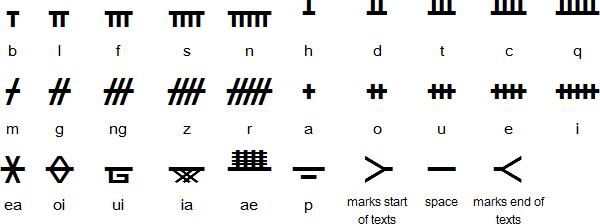Israeli scientists believe they have identified why Arabic is particularly hard to learn to read.
The University of Haifa team say people use both sides of their brain when they begin reading a language - but when learning Arabic this is wasting effort.
The detail of Arabic characters means students should use only the left side of their brain because that side is better at distinguishing detail.
The findings from the study of 40 people are reported in Neuropsychology.
Continue reading the main story
When someone learns to read Arabic they have to work out which letters are which, and which ones go with which sounds.
It is the ability to tell letters apart that seems to work differently in Arabic - because telling the characters apart involves looking at very small details such as the placement of dots.
Professor Zohar Eviatar, who led the research team, said: "The particular characteristics of Arabic make it hard for the right hemisphere to be involved. When you are starting something new, there is a lot of [right hemisphere] involvement."
Clearer differences
The researchers looked at 40 university students. Some of the students only spoke Hebrew, while some also spoke and read Arabic well.
In order to work out which side of the brain reads letters, the researchers flashed letters for a 10th of a second to one side of a screen or the other.
When the eyes see something for just a short time, and it is at one side of a screen, only one brain hemisphere is quick enough to process the image.
The team measured how fast and how accurate the students were when they tried to tell letters apart, first in Hebrew and then in Arabic.
All the students could read Hebrew well, and they all used both left and right hemispheres to tell Hebrew letters apart.
The same thing has previously been found with English letters.
Characters in English and Hebrew are easier to tell apart because there are clearer differences between them than there are in Arabic.
Sensitivity
When they looked at the students' reading of Arabic letters it gave the team a clue about why children find the language difficult to learn to read.
The Hebrew-only speakers behaved like children just starting to read most languages - they tried to tell Arabic letters apart, managed to do it slowly but made a lot of mistakes, and used both hemispheres of their brains.
The good Arabic readers, however, only used their left hemispheres to tell Arabic letters apart.
The researchers were intrigued by this and investigated further. They wanted to know why the right hemisphere was not working when reading Arabic letters, so they set a right hemisphere challenge.
They showed the students pairs of extremely similar Arabic letters - with just "local" differences - and letters that are more different - with "global" differences.
When the Arabic readers saw similar letters with their right hemispheres, they answered randomly - they could not tell them apart at all.
"The right hemisphere is more sensitive to the global aspects of what it's looking at, while the left hemisphere is more sensitive to the local features," says Professor Eviatar.
The team think this may give them some clues about what readers may be doing wrong when they begin to try to read Arabic.
Reading hope
Both young children and adults call on both hemispheres to help them learn a new task.
And using both hemispheres is the right thing to do when reading English or Hebrew - so children's learning strategies would be fine if they were reading another language.
But previous research has found that the right hemisphere is not that good at distinguishing small details, so readers starting to learn Arabic have to learn to focus on small details, which is not natural to them, but could help them shift to their left hemispheres.
Now the researchers want to compare new and highly expert Arabic readers in the hope of finding out what their brains are doing when they look at letters.
Ultimately, they would like to work out how to teach Arabic reading better to children, including helping them to tell letters apart and how to remember which sound goes with which letter.
BBC
---
There you have it, from our long life enemies. Arabic is the language of geniuses
The University of Haifa team say people use both sides of their brain when they begin reading a language - but when learning Arabic this is wasting effort.
The detail of Arabic characters means students should use only the left side of their brain because that side is better at distinguishing detail.
The findings from the study of 40 people are reported in Neuropsychology.
Continue reading the main story
When someone learns to read Arabic they have to work out which letters are which, and which ones go with which sounds.
It is the ability to tell letters apart that seems to work differently in Arabic - because telling the characters apart involves looking at very small details such as the placement of dots.
Professor Zohar Eviatar, who led the research team, said: "The particular characteristics of Arabic make it hard for the right hemisphere to be involved. When you are starting something new, there is a lot of [right hemisphere] involvement."
Clearer differences
The researchers looked at 40 university students. Some of the students only spoke Hebrew, while some also spoke and read Arabic well.
In order to work out which side of the brain reads letters, the researchers flashed letters for a 10th of a second to one side of a screen or the other.
When the eyes see something for just a short time, and it is at one side of a screen, only one brain hemisphere is quick enough to process the image.
The team measured how fast and how accurate the students were when they tried to tell letters apart, first in Hebrew and then in Arabic.
All the students could read Hebrew well, and they all used both left and right hemispheres to tell Hebrew letters apart.
The same thing has previously been found with English letters.
Characters in English and Hebrew are easier to tell apart because there are clearer differences between them than there are in Arabic.
Sensitivity
When they looked at the students' reading of Arabic letters it gave the team a clue about why children find the language difficult to learn to read.
The Hebrew-only speakers behaved like children just starting to read most languages - they tried to tell Arabic letters apart, managed to do it slowly but made a lot of mistakes, and used both hemispheres of their brains.
The good Arabic readers, however, only used their left hemispheres to tell Arabic letters apart.
The researchers were intrigued by this and investigated further. They wanted to know why the right hemisphere was not working when reading Arabic letters, so they set a right hemisphere challenge.
They showed the students pairs of extremely similar Arabic letters - with just "local" differences - and letters that are more different - with "global" differences.
When the Arabic readers saw similar letters with their right hemispheres, they answered randomly - they could not tell them apart at all.
"The right hemisphere is more sensitive to the global aspects of what it's looking at, while the left hemisphere is more sensitive to the local features," says Professor Eviatar.
The team think this may give them some clues about what readers may be doing wrong when they begin to try to read Arabic.
Reading hope
Both young children and adults call on both hemispheres to help them learn a new task.
And using both hemispheres is the right thing to do when reading English or Hebrew - so children's learning strategies would be fine if they were reading another language.
But previous research has found that the right hemisphere is not that good at distinguishing small details, so readers starting to learn Arabic have to learn to focus on small details, which is not natural to them, but could help them shift to their left hemispheres.
Now the researchers want to compare new and highly expert Arabic readers in the hope of finding out what their brains are doing when they look at letters.
Ultimately, they would like to work out how to teach Arabic reading better to children, including helping them to tell letters apart and how to remember which sound goes with which letter.
BBC
---
There you have it, from our long life enemies. Arabic is the language of geniuses
 Buy on AliExpress.com
Buy on AliExpress.com








